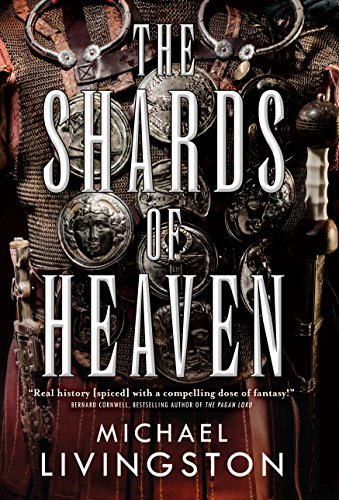
![]() The Shards of Heaven by Michael Livingston
The Shards of Heaven by Michael Livingston
The Shards of Heaven is not author Michael Livingston’s first work. In fact, he’s already a prolific award-winning writer, though mostly focused in his world of academia. Livingston is a Professor of Medieval Literature at The Citadel in South Carolina. The Shards of Heaven is his first novel and he taps into his significant historical knowledge. He liberally expands his knowledge base with strong fantasy elements, though, not unlike George R.R. Martin’s A SONG OF ICE AND FIRE, it’s heavy on history-laden fiction and lighter on the fantasy… at least in this first offering of what’s expected to be a trilogy.
Impending war bubbles across the Roman Empire as Livingston’s story starts. Julius Caesar has been assassinated and after failed attempts at co-ruling the empire, Caesar’s general Marc Antony and his adopted son Octavian jockey for position, allies, and support within their strongholds in the east and west: Antony in Alexandria, Egypt, and Octavian in Rome.
Octavian comes into the knowledge and possession of a mighty weapon — the Trident of Neptune. Only Octavian’s adopted-step-brother Juba can even moderately control it, and while Octavian has designs to use it to secure his victory over Antony, Juba has his own eye on avenging his father’s defeat at the hands of Caesar 15 years earlier. The Trident has Force-like powers in its ability to boil a human’s blood or create a ship-crushing wave in the sea.
The Shards of Heaven is like an over-produced but undeniably delectable feast. (For the purposes of this metaphor, please note that these dishes are not necessarily served in the following order.)
The main course: Roman Empire historical fiction is the dish du jour, specifically focused on the years immediately following the assassination of Julius Caesar and what became a civil war between Octavian (the future Augustus) versus Marc Antony and his (and Caesar’s) lover Cleopatra. In Livingston’s novel, Octavian is bad, Antony is sort of good but mostly boring, and Cleopatra serves her traditional role of behind-the-scenes manipulator. Added to the fray is Juba, a Numidian prince who Caesar adopted following the victory over his father in 46 BCE. Juba and Octavian are step-adopted-brothers. On the surface there’s love, but underneath there’s hate, and one of the driving threads of Livingston’s plot is Juba’s drive for revenge. The story and plot threads of The Shards of Heaven are steeped in real history but sprinkled with a smidgen of fantasy.
The appetizer: Characters are tasty going down, but ultimately not very filling. Lucius Vorenus and Titus Pullo are the grizzled legionnaire veterans protecting the Antony/Cleopatra household. They’re smart, strong and buddies that go back to Julius Caesar’s campaigns in Gaul. They’re also the same true-to-history characters that HBO served up in their ROME series. Didymus is the chief librarian in Alexandria, but also responsible for the education of Cleopatra’s children: Caesarion, son of Cleo and Julius; and Cleo’s children with Antony — Selene, young ingénue and troublemaker; her twin Helios; and the youngest, Philadelphus. Most characters are indelicately drawn with perhaps the exception of Vorenus and Juba, and the later portions of Selene’s narrative.
The side dish: An Indiana Jones-like hunt for mysterious objects runs parallel to the main structural elements surrounding the war between Octavian and Antony’s forces. Driven by Juba’s thirst for revenge and Octavian’s drive for power, Antony’s clan gets caught up in a search for the shards and, naturally, a race against time. And yes, the key shard is actually embedded within Indy’s own Ark of the Covenant.
The dessert: Good ol’ fashioned fantasy — sorta. In my desire to throw no undue spoilers your way, I’ll summarize the fantasy element: the ancient one-ruling-god’s throne was broken into several magical pieces (or shards, if you will). They’re extremely powerful and each more-or-less representative of different elements. Poseidon’s Trident is the most-used weapon in the story and has power over water and liquid. Another shard is hidden within (REDACTED AS A SPOILER ALERT) and has the power over land. The aforementioned Ark has the all-compassing super shard.
Livingston uses The Shards of Heaven to explore the nature of religion in a world where empires span thousands of miles and effective rulers must find ways to incorporate and blend a multitude of religions. Egyptian gods become analogies of Roman gods. Sometimes gods from different nations stand side-by-side. And sometimes, new gods are invented to cover a host of multi-regional religious needs.
Livingston writes solid prose, and seems to enjoy crafting a vibrant battle scene. The fantasy elements play a strong role in the establishment of the story and in its conclusion, but fade in the middle third of the book. This may not be a bad thing, but for those looking for persistent magical happenings, you’ll have to burrow through the Roman battles that wind their way more thoroughly throughout the novel. For a debut offering, The Shards of Heaven is a fun, though inconsistent, read.



Just saw you like Jack Vance. Me too. Surely he offends you somewhere though?
Words fail. I can't imagine what else might offend you. Great series, bizarre and ridiculous review. Especially the 'Nazi sympathizer'…
"Nor Iron Bars a Cage by Kage Harper" Freudian slip there. ;)
[…] (Fantasy Literature): In 1957, Hammer Studios in England came out with the first of their full-color horror creations, […]
I'm going to have to find these and read them.